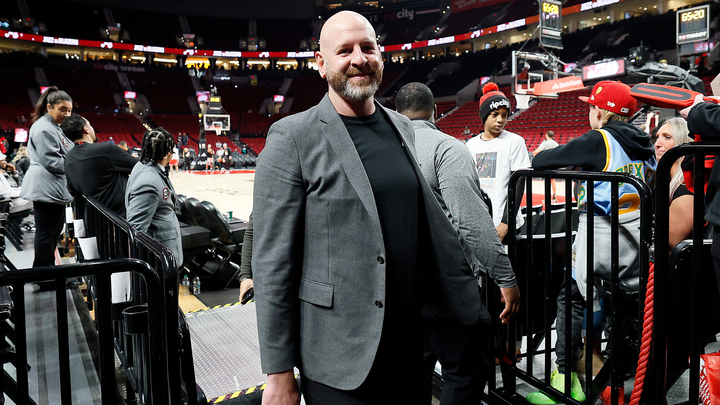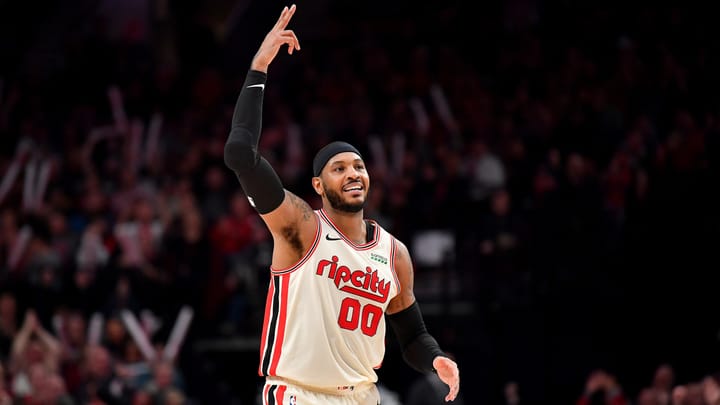How the Trail Blazers Came Out the Other Side of the Most Pivotal Week of Their Season
One week after their worst loss of the season, the Blazers' vibes have never been better.

📍 PORTLAND, Ore. — How things change in a week.
It seemed impossible last Sunday, coming off the lifeless 45-point loss to Memphis, that the Trail Blazers would end that same homestand with the vibes as good as they’ve ever been since the start of the rebuild.
Three wins in a row will do that.
Looking at their schedule when it was announced in August, they would have been lucky to have three wins, total, by the end of the calendar year. Before their three-day break this week, they played five games in seven nights; they’re about to start another stretch of just about nonstop games. Sunday afternoon’s win over Atlanta was the first game they played all season against an Eastern Conference team, and they won’t play another one until Indiana a week from Wednesday to close out their upcoming five-game road trip.
They’ve now had the same number of three-game winning streaks that they had all of last season. And they won these three games the exact way they want to win games: with defense and big performances from players—Donovan Clingan against the Timberwolves, Shaedon Sharpe twice in a row on Wednesday and Sunday—that, in an ideal world, will still be here when the Blazers are competing for the playoffs again.
It was unthinkable a week ago that they’d be in this position. But they haven’t just come out the other side of that disastrous loss with morale intact. They’ve weathered it and started creating a blueprint for what the final product of this rebuild could look like when they have the kind of high-end talent they need to win in a real way.

“Anybody that sleeps well tonight, you're a loser,” Chauncey Billups told his team in the locker room after the Grizzlies blowout. And if that’s what he was willing to share publicly, imagine the version of that speech he gave behind closed doors.
“He was fired up,” Clingan said after practice the following day. “He was mad, and he had every right to be. We didn't show up to play the way we were supposed to.”
Clingan hasn’t lost like that very much in his high-school or college career, but having played for Dan Hurley at UConn, what Billups said to the team was light.
“He told us what we needed to hear,” Robert Williams III said. “We played soft. We laid down. He hates that, we hate that. We're trying to build a model here for the team, but we know exactly what we did wrong.”
Their practice the day after the loss wasn’t much of a practice. They didn’t do a lot of on-court work. Some film, but mostly a lot of talking about what happened the night before and how to make sure it wouldn’t happen again.
It wasn’t a players-only meeting like a lot of these meetings are after losses like that. Billups and the rest of the coaching staff were involved.
“It was Chauncey starting us off,” Toumani Camara said. “As the head coach, that's something he's been doing, to show us that he's trying to lead us in the best way that he can. A lot of us participated in the conversation. I think everyone had their role to be played. We have a lot of leaders on the team that were vocal. It's something that's needed. In every situation, even with families, when you work with people, you can't just keep your feelings to yourself if you want things to work out. Being able to have a safe space and being able to talk to each other I think is crucial for our team. I think it was very productive to be able to have the whole coaching staff and the whole team talking, and just say whatever is on your heart. At the end of the day, we're humans, we're not robots, so we're just trying to figure out a way to work together.”
The Blazers had a few games like that last season. An early January road trip was full of them, including a 62-point loss in Oklahoma City, and then they lost again by 60 in Miami in March. This one felt worse for a few reasons. For one, it came so early in the season. They also had their full team (minus Matisse Thybulle, who hasn’t played yet this season), so they couldn’t use the injury excuse for why things went so sideways. But most importantly, that performance was out of character for the team they were for most of the first three weeks of the season. For the most part leading into that game, the Blazers lost a lot, but they competed.
“We had a good few games to start the season, and then lost a little bit of trust in each other and started to build it back up,” Scoot Henderson said. “That's all that is. We've just got to find a way to be consistent with that. Be consistent with trusting each other still, up or down.”

The two Timberwolves games were a gut check. It wasn’t a great sign that their chance at a couple of “get-right games” would be coming against a team that beat them by 25 points days earlier, coming off a trip to the Western Conference Finals. The back-to-back could have gone one of two ways. If they didn’t come out stronger, after all the talk of a team meeting to clear the air, there might have been talk of bigger changes.
But they did, both times. The first one was particularly impressive, with Williams having his best game as a Blazer and Camara playing excellent defense on Anthony Edwards. They survived Anfernee Simons’ early exit thanks to one of Henderson’s strongest games of the season. They got down big early and, unlike the Memphis game, fought back and were firmly in control in the second half.
“We showed some character,” Deni Avdija said after that game, which was also his best individual performance of an up-and-down first season in Portland. “After that loss we had the other night, I felt like everyone was kind of rough on themselves. I feel like that's not us. That's not our identity. Even if you lose, there's a way to lose. We had a conversation, we had a talk with the whole team. We had to figure something out. So we had a good talk, and we came in refreshed, with different vibes.”
They kept it going the next night, behind career nights from Clingan and Sharpe. With Williams out for injury management, Clingan had to play a career-high 31 minutes and went toe-to-toe with Rudy Gobert. With Simons out, they got good minutes from Dalano Banton. Camara and Kris Murray, who’s been in and out of the rotation all season, were key defensively.
It was clear the message of togetherness from the big meeting was resonating in a big way.
“I think there's a lot to be gained from honesty, and we addressed those things,” Billups said after the second win. “It's just amazing what you can do when you do it together. No matter who's out there, when you play for your buddy, it's amazing how good you can play. Whether you win or lose. That's all I can tell you. We're playing so hard, we're playing together, they care about playing well together, and it's amazing what you can do.”

The following day, Billups banned his players from going near the practice facility. Coming off the back-to-back, which capped off five games in seven nights, he instituted a so-called “blackout day” and closed the gym completely, forcing everybody to get away from each other for a day and reset mentally.
“Three or four of the guys that don't play that much were like, 'Yeah, but can we come in?,’” Billups said. “I told them, ‘No. Don't even show up.’”
The starters came out sluggish on Sunday after three days off, but a bench unit with Banton, Murray, Rayan Rupert, Avdija and Williams cut what was a 16-point Hawks lead down to eight at the half.
Then, Sharpe took over in the second half and they outscored Atlanta by 21 in the third quarter. He scored the Blazers’ last 11 points of the game, hit a go-ahead three after the Hawks battled back, and got the game-sealing steal, aided by some stellar defense by Camara on Trae Young.
The last two wins were more characteristic of who the Blazers are, and how they can win. The first Timberwolves win, while a much-needed response after the blowout loss to Memphis, came on the back of unsustainable shooting. In that game, the fourth-worst three-point shooting team in the NBA hit as many threes (18) as they’d hit in the previous three games combined. In the second Timberwolves game and Sunday’s win over the Hawks, they hit nine apiece and got by with defense. It’s not the way for NBA teams to win at a high level in 2024, but it’s the way this team, as it’s presently constructed, will have to.
“There's so much beauty in winning ugly games,” Billups said after Sunday’s win. “There's so much character that comes with that. It's easy to win games now when you make 20 threes or whatever, but when you have to get it the hard way, it's tough. This guy gets a block, this guy gets a steal, this guy gets two threes they usually don't make. So many great things can happen. We had to manufacture all of that. I'm proud of our guys for just sticking with it.”
It’s tough to say where the Blazers’ next win will come from. The upcoming five-game road trip starts in Oklahoma City (still a juggernaut despite losing Chet Holmgren for the foreseeable future) and then goes to Houston, Memphis and Indiana. Their next easy win on the schedule may not be until they face Utah at home on Dec. 6. This three-game winning streak could have to be everyone’s dose of good vibes for the next while.
At some point, there will be another game like the Memphis loss. It’s inevitable in a long season for a young team. If there are too many more of them, some of those conversations about change that were averted this week may have to be revisited. But now, the Blazers have shown the league—and themselves—that they can get through those tough stretches intact.
“We really care,” Clingan said. “We want to take it to the next step and find the right things to do.”




Comments ()